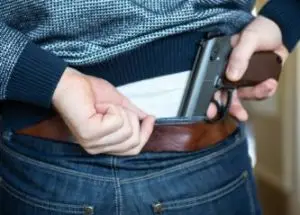
California has some of the harshest restrictions on gun ownership in the United States. The state highly regulates gun ownership through numerous gun laws. Being charged with the crime of carrying a concealed weapon without a permit can have severe repercussions.
If the crime is a misdemeanor then a person can be looking at up to one year in prison and/or a maximum fine of $1,000. For a felony charge, it can go all the way to three years in prison and/or a maximum fine of $10,000.
Since being found guilty of this crime can have devastating consequences, you will want to have experienced legal counsel on your side. If you have been accused of carrying a concealed weapon without a permit you want to speak to a criminal defense lawyer as soon as possible.
California Law on Guns
Under California Penal Code sections 25850 and 26350, you cannot carry a gun unless you are a legal gun owner with the weapon in your own home or business, and not just any place of employment: only a self-owned businesses. It does not matter if the gun is loaded or not.
A way around this to apply for a permit to carry a concealed weapon (CCW) which will allow you to carry your gun in California.
Most importantly, California Penal Code 25400 is the law that applies if you have been found guilty of carrying a concealed gun without a permit. The penalty for failing to have a permit depends on whether the concealed weapon charge is a misdemeanor or a felony.
Misdemeanor crimes will allow the judge to weigh a number of factors to decide on what kind of punishment, they will issue. Some of these factors are:
- Failing to cooperate with an officer during an arrest
- History of violence
- An intent to use the weapon
- Criminal history
However, depending on the circumstances you can be charged with a felony instead. Some reasons why carrying a concealed gun without a permit will be charged as a felony instead of a misdemeanor are:
- The concealed gun was stolen or the person carrying it had reasonable cause to believe it was stolen.
- The person carrying the gun is not allowed to carry a gun (for example, if the individual has attempted to or actually committed a violent offense such as robbery or rape).
- The person being charged did not have lawful possession of the gun.
- There has been a previous firearm conviction.
- The person with the hidden weapon was convicted of a felony prior to this charge.
- The individual accused of carrying the gun is an ongoing member of a gang
As the charges can vary dramatically depending on whether you are charged with a felony or misdemeanor, it is very important to speak with a California lawyer that can advise you about your case. The options you have and the choices you want to make can be different depending on the charges that you are facing.
For a free legal consultation, call (310) 896-2723
Potential Defenses
While the situation may seem very frightening, take comfort by speaking to an experienced criminal defense lawyer that can guide you through this process. There are a few strategies your lawyer may be able to use depending on the particular situation you were in. Some of the defense strategies you may be able to use are:
- Home or Business – you are allowed to carry your weapon if you can show you are in an area that is classified as your business or home.
- Fourth Amendment Violation – this applies if there was an illegal search or seizure which resulted in the police finding the weapon.
- Legal Possession – anyone licensed to have a gun can transport it if it is in the trunk or in a locked box.
- Lack of Knowledge – you would have to show that you were not aware that there was a gun in the area (ex. If someone else placed the gun there).
If you have been accused of carrying a concealed weapon without a permit, you will need professional help to avoid the more serious consequences of this crime. At Simmrin Law Group, a team of lawyers are available to assist with your criminal defense issues. Do not wait any longer and get your FREE consultation today by calling us at (310)-896-2723 or by filling out the form on the right.
Call or text (310) 896-2723 or complete a Free Case Evaluation form
